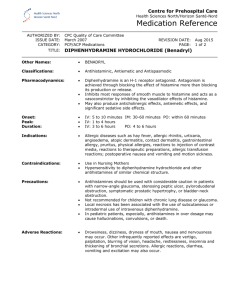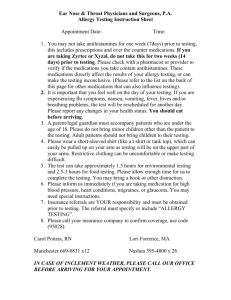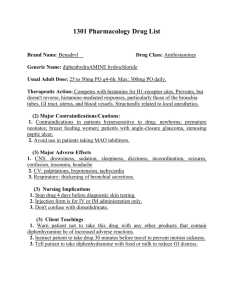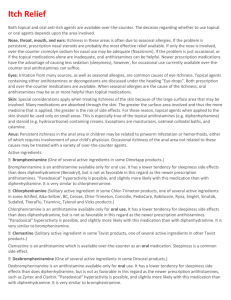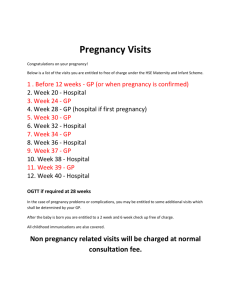Diphenhydramine and Pregnancy
advertisement
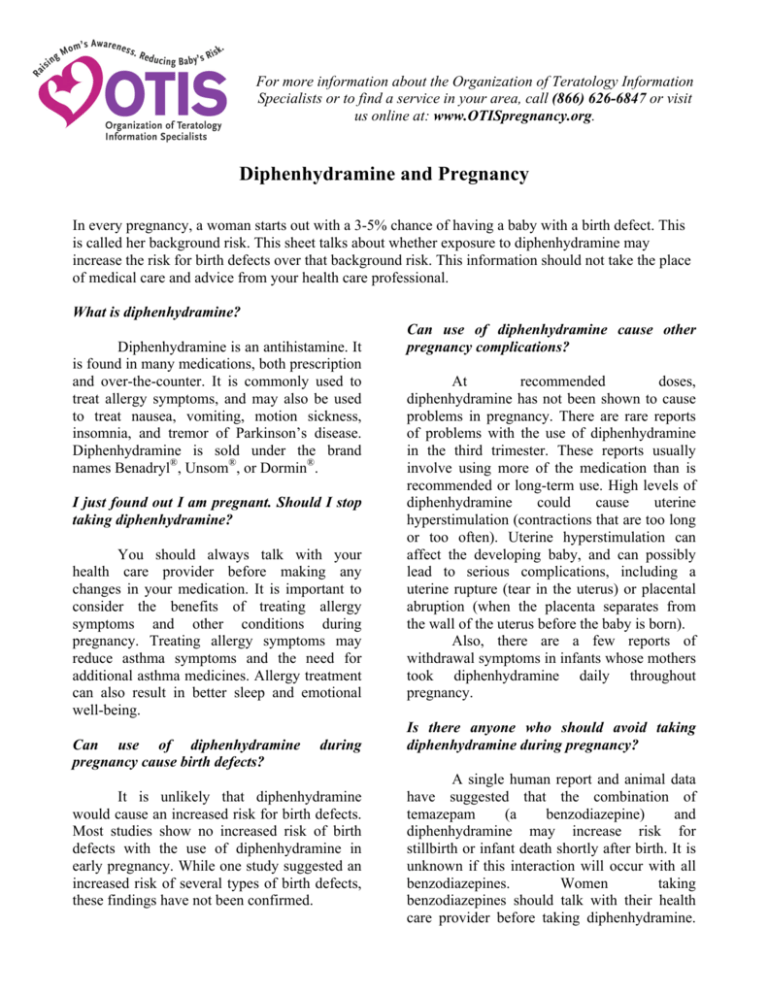
For more information about the Organization of Teratology Information Specialists or to find a service in your area, call (866) 626-6847 or visit us online at: www.OTISpregnancy.org. Diphenhydramine and Pregnancy In every pregnancy, a woman starts out with a 3-5% chance of having a baby with a birth defect. This is called her background risk. This sheet talks about whether exposure to diphenhydramine may increase the risk for birth defects over that background risk. This information should not take the place of medical care and advice from your health care professional. What is diphenhydramine? Diphenhydramine is an antihistamine. It is found in many medications, both prescription and over-the-counter. It is commonly used to treat allergy symptoms, and may also be used to treat nausea, vomiting, motion sickness, insomnia, and tremor of Parkinson’s disease. Diphenhydramine is sold under the brand names Benadryl®, Unsom®, or Dormin®. I just found out I am pregnant. Should I stop taking diphenhydramine? You should always talk with your health care provider before making any changes in your medication. It is important to consider the benefits of treating allergy symptoms and other conditions during pregnancy. Treating allergy symptoms may reduce asthma symptoms and the need for additional asthma medicines. Allergy treatment can also result in better sleep and emotional well-being. Can use of diphenhydramine pregnancy cause birth defects? during It is unlikely that diphenhydramine would cause an increased risk for birth defects. Most studies show no increased risk of birth defects with the use of diphenhydramine in early pregnancy. While one study suggested an increased risk of several types of birth defects, these findings have not been confirmed. Can use of diphenhydramine cause other pregnancy complications? At recommended doses, diphenhydramine has not been shown to cause problems in pregnancy. There are rare reports of problems with the use of diphenhydramine in the third trimester. These reports usually involve using more of the medication than is recommended or long-term use. High levels of diphenhydramine could cause uterine hyperstimulation (contractions that are too long or too often). Uterine hyperstimulation can affect the developing baby, and can possibly lead to serious complications, including a uterine rupture (tear in the uterus) or placental abruption (when the placenta separates from the wall of the uterus before the baby is born). Also, there are a few reports of withdrawal symptoms in infants whose mothers took diphenhydramine daily throughout pregnancy. Is there anyone who should avoid taking diphenhydramine during pregnancy? A single human report and animal data have suggested that the combination of temazepam (a benzodiazepine) and diphenhydramine may increase risk for stillbirth or infant death shortly after birth. It is unknown if this interaction will occur with all benzodiazepines. Women taking benzodiazepines should talk with their health care provider before taking diphenhydramine. For more information about benzodiazepines, see the OTIS fact sheet at http://www.mothertobaby.org/files/benzodiaze pines.pdf. Can I breastfeed diphenhydramine? while taking Because diphenhydramine can cause sleepiness in adults, it may do the same for the baby. It may not be preferred antihistamine for long-term use during breastfeeding. If you need to take an antihistamine regularly, ask your health care provider if a non-sedating one may work on your symptoms. Antihistamines as a group may lower the amount of milk a woman makes, especially when using long acting antihistamines and when used with decongestants like pseudoephedrine or phenylephrine. Two studies with women who used an antihistamine (not just diphenhydramine) while breastfeeding reported their babies were irritable, sleepier, or slept less. Be sure to discuss any medications you are taking and your options for breastfeeding with your health care provider as well as the baby’s pediatrician. What if the father of the baby takes diphenhydramine? There is no evidence that suggests that a man’s diphenhydramine use would cause any problems for conceiving or problems during pregnancy. In general, exposures that fathers have are unlikely to increase the risk to a pregnancy. For more information, please see the OTIS fact sheet about Paternal Exposures at http://www.mothertobaby.org/files/paternal.pdf August 2013 Copyright by OTIS. Selected References: Anderka M, Mitchell AA, Louik C, Werler MM, Hernandez-Diaz S, Rasmussen SA, and the National Birth Defects Prevention Study. Medications used to treat nausea and vomiting of pregnancy and the risk of selected birth defects. Birth Defects Res (Part A) 94:22-30, 2012 Aselton P, Jick H, Milunsky A, Hunter JR, Stergachis A: First-trimester drug use and congenital disorders. Obstet Gynecol 65(4):451-455, 1985 Brost BC, Scardo JA, Newman RB: Diphenhydramine overdose during pregnancy: Lessons from the past. Am J Obstet Gynecol 175:1376-7, 1996 Chiavegatto S, Bernardi MM, de-Souza-Spinosa H: Effects of prenatal diphenhydramine administration on sexual behavior in rats. Braz J Med Biol Res 22(6):729-732, 1989 Chiavegatto S, Oliveira CA, Bernardi MM: Prenatal exposure of rats to diphenhydramine: Effects on physical development, open field, and gonadal hormone levels in adults. Neurotoxicol Teratol 19:511-516, 1997. Gilboa SM, Strickland MJ, Olshan AF, Werler MM, Correa A; National Birth Defects Prevention Study: Use of antihistamine medications during early pregnancy and isolated major malformations. Birth Defects Res A Clin Mol Teratol 85(2):137-150, 2009 Hara GS, Carter RP, Krantz KE: Dramamine in labor: potential boon or a possible bomb? J Kans Med Soc 81(3):134-136, 155, 1980 Heinonen OP, Slone D, Shapiro S: Birth Defects and Drugs in Pregnancy. Littleton, Mass.: John Wright-PSG, 1977; pp 437, 475 Ito S, Blajchman A, Stephenson M, Eliopoulos C, Koren G: Prospective follow-up of adverse reactions in breast-fed infants exposed to maternal medication. Am J Obstet Gynecol 168:1393-9, 1993. Jick H, Holmes LB, Hunter JR, Madsen S, Stergachis A: First-trimester drug use and congenital disorders. JAMA 246(4):343-346, 1981 Kargas GA et al: Perinatal mortality due to interaction of diphenhydramine and temazepam. N Eng J Med 313:1417-8, 1985. Moraes AP, Schwarz A, Spinosa HS, Florio JC, Bernardi MM: Maternal exposure to diphenhydramine during the fetal period in rats: effects on physical and neurobehavioral development and on neurochemical parameters. Neurotoxicol Teratol 26(5):681-692, 2004 Moretti ME, Liau-Chu M, Taddio A, Ito S, Koren G: Adverse events in breastfed infants exposed to antihistamines in maternal milk. Reprod Toxicol 9: 588, 1995. O'Brien TE: Excretion of drugs in human milk. Am J Hosp Pharm 31:844-54, 1974. Sturman G, Freeman P, Meade HM, Seeley NA, Davies WJ: Factors affecting the extent of fetal fragility induced by histamine H1 antagonists. Inflamm Res 46(Suppl 1):S53-S54, 1997 If you have questions about the information on this fact sheet or other exposures during pregnancy, call OTIS at 1-866-626-6847.
